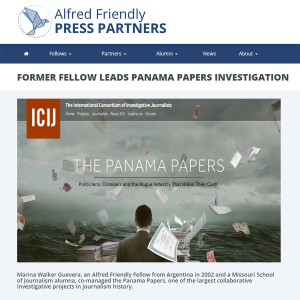Alumna Leads ‘Panama Papers’ Investigation, Shares Project with Students
Marina Walker, MA ’05, Co-Managed One of the Largest Collaborative Investigative Projects in Journalism History
Columbia, Mo. (May 10, 2016) — Marina Walker Guevera, MA ’05, and a 2002 Alfred Friendly Fellow from Argentina, co-managed the Panama Papers, one of the largest collaborative investigative projects in journalism history.
Walker decided to become an investigative reporter while working on her master’s project at the Missouri School of Journalism. An award-winning journalist, she came to the School as the first Tina Hills Fellow for Latin American Journalists in 2003. Hills is the former publisher of the Puerto Rican newspaper, El Mundo. Mrs. Hills is the widow of Lee Hills, a former chief executive officer of Knight-Ridder newspapers. Both were presidents of the Inter-American Press Association. Lee Hills Hall is named for Mr. Hills and is home to the Columbia Missourian.

Walker now is deputy director of the International Consortium of Investigative Journalists, a Washington D.C.-based network of nearly 200 investigative journalists from more than 65 countries who collaborate on in-depth investigative stories.
For the Panama Papers project, Walker and ICIJ Director Gerard Ryle managed the reporters, researchers, data experts, fact-checkers and editors in the organization along with several hundred contributing reporters. Walker recently talked via Skype to a group of students at the Missouri School of Journalism, and here are excerpts from their conversation:
The leak included documents like emails, passports, corporate records, and financial spreadsheets from a multinational law firm based in Panama, Mossack Fonseca. Walker told the students about the technological challenges they faced with the substantial amount of data they had to go through. It took the team a full year to analyze, verify, interpret, report and write about the 11.5 million leaked files.
They set up a “virtual newsroom” that looked like a Facebook page so that journalists around the world could share their findings and talk about their progress. This virtual newsroom used encryption to authenticate the identity of the people accessing the site, as it was strictly for the eyes of the journalists involved in the project.
Although some of the journalists involved wanted to immediately expose the injustices they were seeing in the documents, Walker and Ryle kept all their information secret until a sufficient amount of the documents had been analyzed and fact checked, and once there had been a broad discussion as to how to tell the story. They could not even talk to the people or organizations mentioned in the leaks. It was late in the process when the journalists were able question their targets, although there was always a sense of caution and reservation.
The journalists carefully fact-checked every piece of data they planned to use to make sure the information was legitimate. Walker assured the students all the data from the leaks matched with what they found out themselves independently. The team also had many conversations on how to effectively explain and give context to the data. One of the main takeaways, Walker says, is the fact that most of these activities were legal, which exposes a systematic problem with governments around the world.
Walker said this effort demonstrates that journalists can work together, rather than always think of other journalists as the competition. Considering the WikiLeaks activity, the Edward Snowden leak and now the Panama Papers leak, Walker called the times the “golden era” for investigative journalism, in which journalists with data skills can work together and use advanced technology to make sense of huge amounts of leaked data that would not have been possible in the past.
The documents revealed the secret owners of bank accounts and companies in 21 offshore jurisdictions. The initial project, Secrecy for Sale: Inside the Offshore Money Maze, exposed injustices, triggered protests and caused government resignations.
Walker says they were only waiting to publish a set of stories that were able to make a change, and there will be more articles related to the Panama Papers.
Updated: September 25, 2020